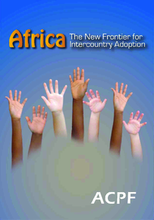This publication was prepared as a background document to inform the discussions and debates during the Fifth International Policy Conference on the African Child held on 29-30 May 2012 in Addis Ababa, Ethiopia. This report provides a situational analysis of the law and practice of intercountry adoption in Africa, with the aim of informing debate on conceptualizing, developing and implementing policies, laws, and programs and research in relation to intercountry adoption in Africa.
The report highlights that while levels of intercountry adoption from African countries are still quite modest compared to adoptions from the world’s top four countries of origin, there are concrete indications that interest in adoption from African countries continue to increase. The report argues that Africa is considered as “the new frontier” for intercountry adoption and questions whether the continent is equipped to provide its children with the necessary safeguards in respect of the practice.
A central aim of this report is to assess and explore how the best interests of the African child can be upheld in intercountry adoption and its general conclusion is that the African continent is still ill-equipped in law, policy and practice to provide its children with the necessary safeguards in respect of intercountry adoptions. Protecting the best interests of children in Africa is and should be the primary obligation of African families, communities, governments and institutions.

